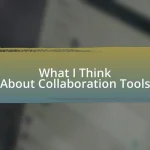Key takeaways:
- Web development frameworks like React, Django, and Laravel simplify complex coding tasks and promote best practices.
- React’s component-based architecture allows for the creation of dynamic user interfaces with reusable code.
- Django’s built-in features, such as its ORM and admin panel, streamline database interactions and development processes.
- Laravel’s expressive routing system enhances the creation of RESTful APIs, making the development experience more intuitive.
Author: Charlotte Everly
Bio: Charlotte Everly is an accomplished author known for her evocative storytelling and richly drawn characters. With a background in literature and creative writing, she weaves tales that explore the complexities of human relationships and the beauty of everyday life. Charlotte’s debut novel was met with critical acclaim, earning her a dedicated readership and multiple awards. When she isn’t penning her next bestseller, she enjoys hiking in the mountains and sipping coffee at her local café. She resides in Seattle with her two rescue dogs, Bella and Max.
Understanding web development frameworks
When I first encountered web development frameworks, I was struck by their ability to simplify complex tasks. I recall the initial relief I felt when I realized I could use a framework like React to manage state in my applications without writing a mountain of code. Isn’t it fascinating how a well-structured framework can provide the foundation you didn’t know you were missing?
As I dove deeper into the world of frameworks, I found they not only sped up my development process but also encouraged best practices. The first time I built a project with Django, I was surprised by how the built-in features handled user authentication, allowing me to focus on more innovative aspects of my application. Can you imagine how much time that saved me?
Frameworks also foster a vibrant community of developers. I remember feeling instantly connected to an online group of Laravel users who shared tips and tricks that transformed my coding experience. It’s incredible how frameworks can create a sense of belonging and shared purpose in the often-isolating world of programming.
Overview of my favorite frameworks
When I think about my favorite frameworks, three names immediately come to mind: React, Django, and Laravel. React stands out because of its component-based architecture, which allows me to create reusable pieces of code. I remember the moment I realized I could build dynamic user interfaces with just a few components; it felt like unlocking a hidden door to creativity in my development process.
Django captures my heart with its “batteries included” philosophy. I vividly recall being amazed by its admin panel—an out-of-the-box feature that saved me countless hours. It felt like having a personal assistant who handled the mundane tasks while I focused on bringing my vision to life. How refreshing is it to have a framework that anticipates your needs before you even realize them?
Then there’s Laravel, which introduced me to the elegant world of PHP development. I still smile thinking about the thrill of using Eloquent for database interactions, making what once seemed daunting, incredibly intuitive. Isn’t it astounding how the right framework can make even challenging concepts feel more approachable? These experiences have not only shaped my workflow but have also deepened my appreciation for the art of web development.
Key features of each framework
React’s key features encompass its virtual DOM and declarative syntax, which are game-changers for performance and simplicity. I’ll never forget the first time I tweaked a state in a component and saw the UI automatically update—like magic! Isn’t it rewarding to see changes reflected instantaneously, making debug processes feel less daunting?
With Django, the built-in ORM (Object-Relational Mapping) simplifies database interactions. I recall being frustrated by SQL queries until Django’s ORM allowed me to manage databases using Python objects. How liberating is it to think in terms of models rather than tables? This abstraction empowers developers to focus on building applications without getting bogged down by complex database languages.
Laravel’s routing system stands out with its expressive syntax and ease of use. I remember clearly how it transformed my approach to RESTful APIs, making them less intimidating. Have you ever experienced the satisfaction of defining a route in just a couple of lines of code? It’s moments like these that ignite my passion for coding, reminding me of why I fell in love with web development in the first place.















